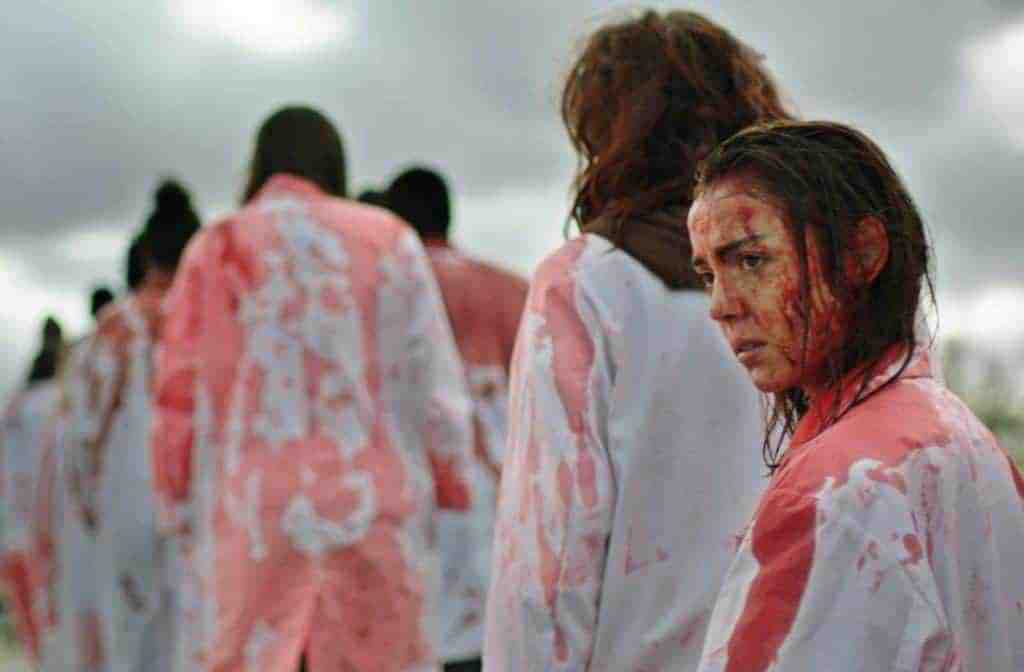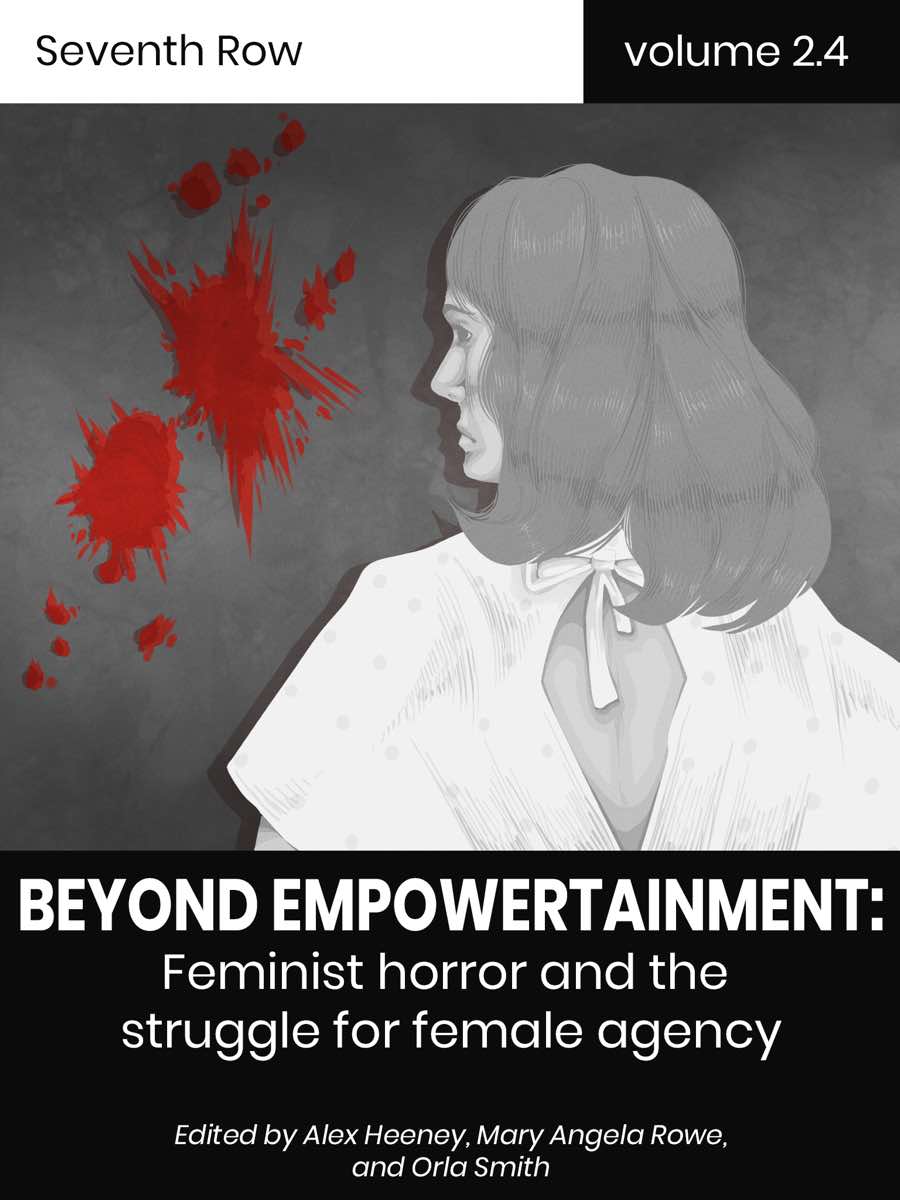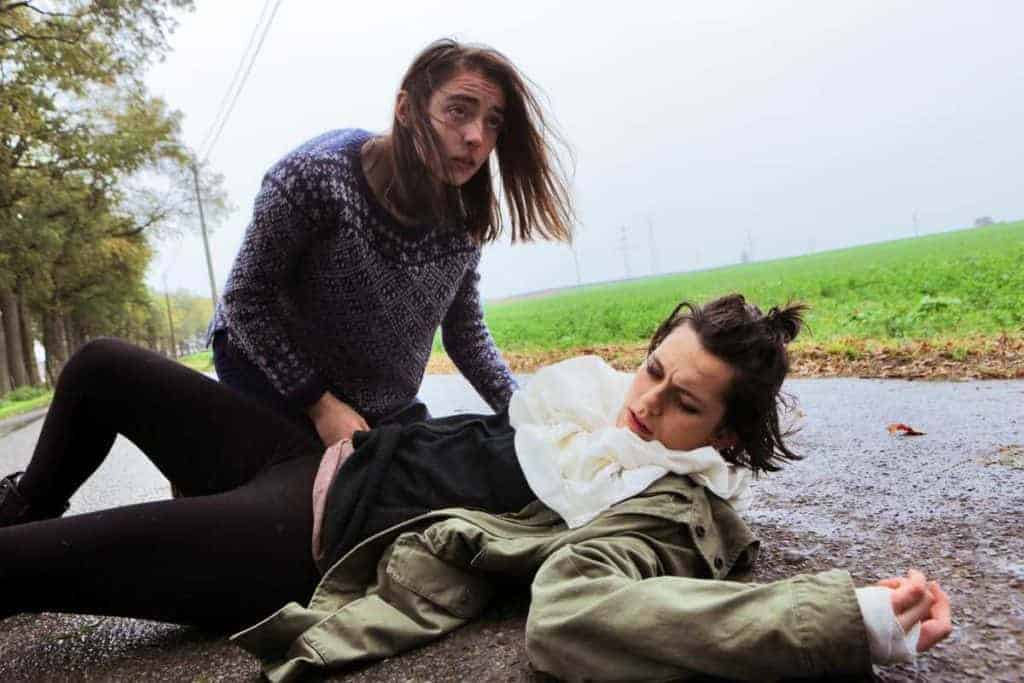Mary Angela Rowe’s review of Raw. Cannibalism is definitely a lady problem in Julia Ducournau’s Raw, but the film isn’t about the horror of female sexuality so much as the twisted results of shoving young women into a pressure cooker of experiences and expectations.
This is an excerpt of the essay which appears in the ebook Beyond Empowertainment: Feminist Horror and The Struggle for Female Agency. Get your copy of the ebook here.
Note: This essay contains spoilers.
This essay was originally published on October 10, 2016 as part of our Toronto International Film Festival Coverage.
Three people fainted during the North American premiere of Raw, writer-director Julia Ducournau’s cannibalistic coming-of-age story. Crisply shot and incredibly well-acted, Raw confidently straddles the boundary between gore-shock and psychological horror. Ducournau’s film centres on Justine (Garance Marillier), a young vegetarian who develops strange appetites after she’s forced to consume raw meat as part of a hazing ritual at veterinary school. Justine’s sister Alexia (Ella Rumpf), an older vet student, at first seems distant, but the two prove more alike than we can initially imagine. Together, both sisters embody a new kind of female body horror where carnal hunger isn’t contingent on sexual rapacity.
[clickToTweet tweet=”In RAW, fleshly desires and humiliation are entwined as part of a group bonding ritual.” quote=”Justine’s appetite for flesh is born in this crucible, where fleshly desires and humiliation are entwined as part of a group bonding ritual.”]
Vet college, set in a coldly Brutalist concrete-block campus, is very nearly an adult-free zone. Justine’s parents (Joanna Preiss and Laurent Lucas) drop her off and then peel out of the parking lot, leaving her alone; the lone professor we meet mocks Justine and tells her he doesn’t like high achievers. We see relatively little of the academic life — there seem to be no rules here except whatever the senior students decide to impose on the frosh. It’s cold, anarchic, and completely cut off from reality. It may as well be another world.
Justine’s appetite for flesh is born in this crucible, where fleshly desires and humiliation are entwined as part of a group bonding ritual. Ducournau lingers on the humiliations imposed on Justine by the hazing, and the subtler pressures bearing down upon her. Justine is ordered to dress like a tart, and the frosh are made to crawl half-naked in the dark to a bacchanal they can’t leave. At one point, Justine is coated in blue paint and shoved into a washroom with a boy covered in yellow, and ordered not to emerge until they’re both green. (For the virginal Justine, this incident triggers desires that are more than sexual.) Outside of school, Alexia mocks Justine’s unshaven armpits and ungroomed bikini line, leading to one of the most darkly funny waxing scenes ever committed to film.
Want to read the rest of the interview? Order a copy of our ebook on feminist horror beyond empowertainment here.
[wcm_restrict]
Female body horror often centres on the monstrousness of femininity — think lycanthropy-as-menstruation from the iconic Canadian horror flick Ginger Snaps, to which Raw has been compared. Cannibalism is definitely a lady problem in Ducournau’s film, in the sense that predators are exclusively women and the prey are mostly male. But Ducournau’s script is refreshing in that it’s not about the horror of female sexuality, but rather, the twisted results of shoving young women into a pressure cooker of experiences and expectations. Justine’s hunger might have lain dormant forever, had she not been subjected to eating raw meat at her hazing. Where in Ginger Snaps the desire to consume was an extension of Ginger’s sex drive, in Raw, sex is merely a proxy for another type of hunger. Justine may become more hedonistic as her hunger increases, but when she loses her virginity, she sinks her teeth into her own arm as she comes. Her transformation is not triggered by puberty or by the onset of sexual desire, but by the pressure to conform during her initiation.
[clickToTweet tweet=”Cannibalism is definitely a lady problem in Julia Ducournau’s RAW.” quote=”Cannibalism is definitely a lady problem in Ducournau’s film, in the sense that predators are exclusively women and the prey are mostly male.”]
Justine wants to keep her head down and fly under the radar, but she can’t — she’s marked from the first as a super-student, and she’s isolated by her unwillingness to conform. We never see Justine socialise with anyone other than Alexia or Adrien (Rabah Naït Oufella), her sweetly easygoing gay roommate. She suffers the initiation rituals, which are supposed to be a bonding exercise, with ill grace: Justine came to vet college to help animals, whom, we learn in an early scene, she regards as almost human. Given this attitude, the jump from eating rabbit to eating people isn’t as large as it first appears.
Garance Marillier’s performance as the fragile, feral Justine is riveting, making us empathize with a woman drawn to breaking one of the last taboos. Marillier draws us into Justine’s vulnerability, her struggle against the hunger growing inside her and the pressures distorting her from the outside. As Justine changes, Marillier’s whole physicality seems to shift: her face has sharper angles, her joints are more prominent, and she moves with the aggression of an animal rather than a gangly teen.
Marillier’s command of her character is such that the creepiest shot in the film doesn’t involve any blood or body parts; instead, it’s Justine sitting in a corner at a house party. In the foreground, among dancing figures, a young woman bends down and licks at a young man’s eyeball. Ducournau slowly pushes in past the couple themselves until the frame centres on Justine, perched like a little gargoyle on a counter and bathed in red light, grinning and watching the couple from behind. This may be the first time we’ve seen Justine really smile, and at this moment, Marillier imbues her with something inhuman. Justine’s voyeuristic consumption of this pair, as their foreplay mirrors what she really wants, is more terrifying than watching her consume human flesh.
Read our Special Issue on Personal Shopper here.
[/wcm_restrict]





